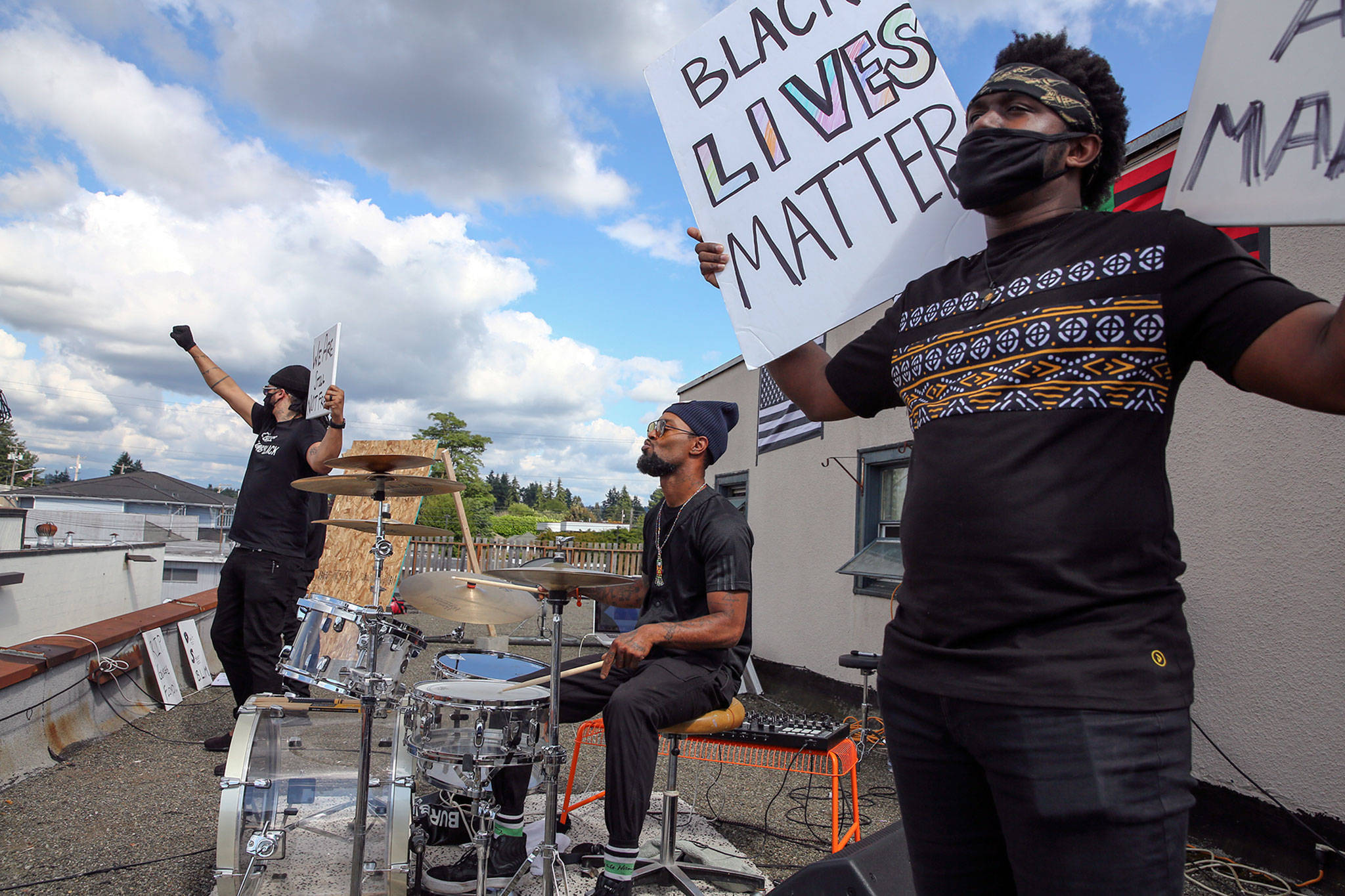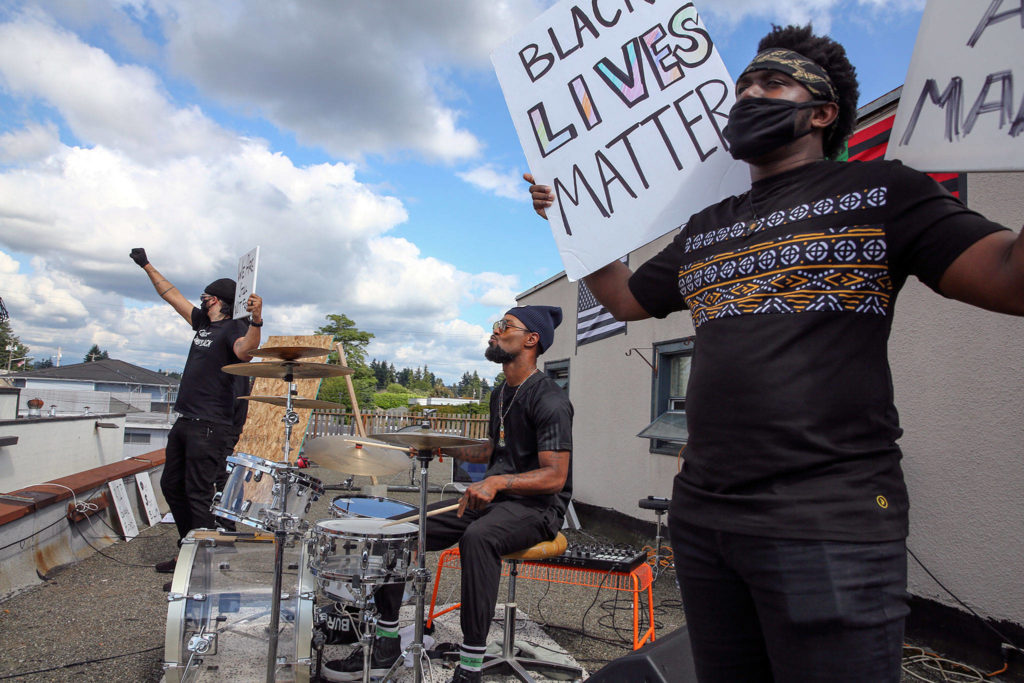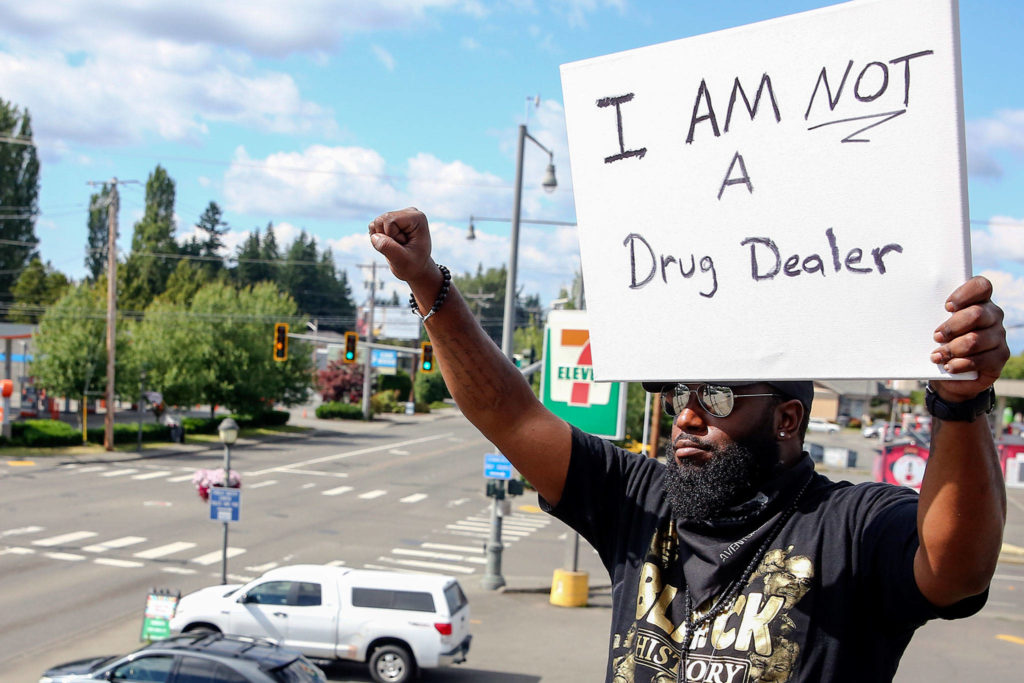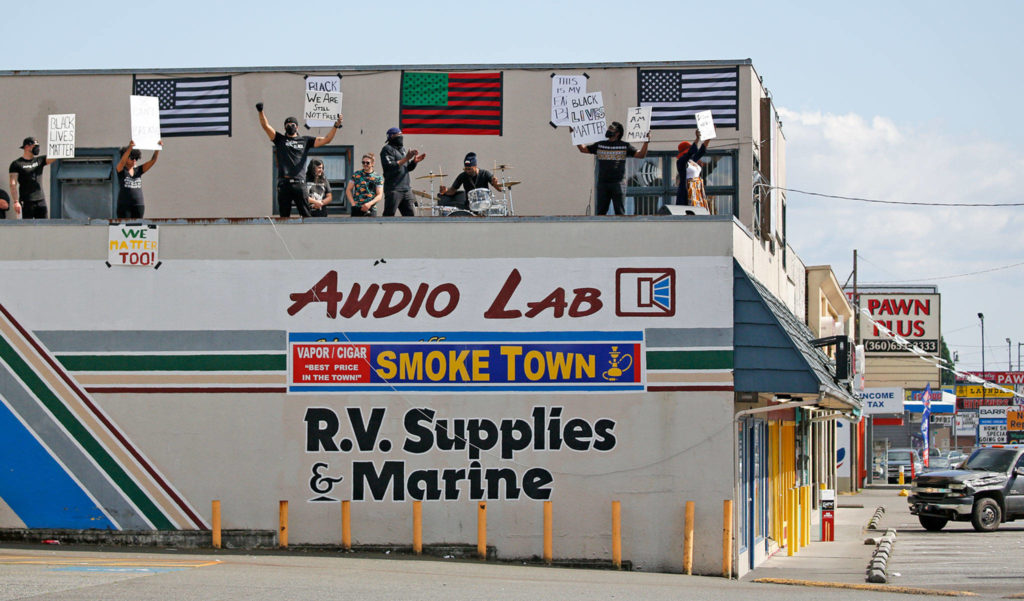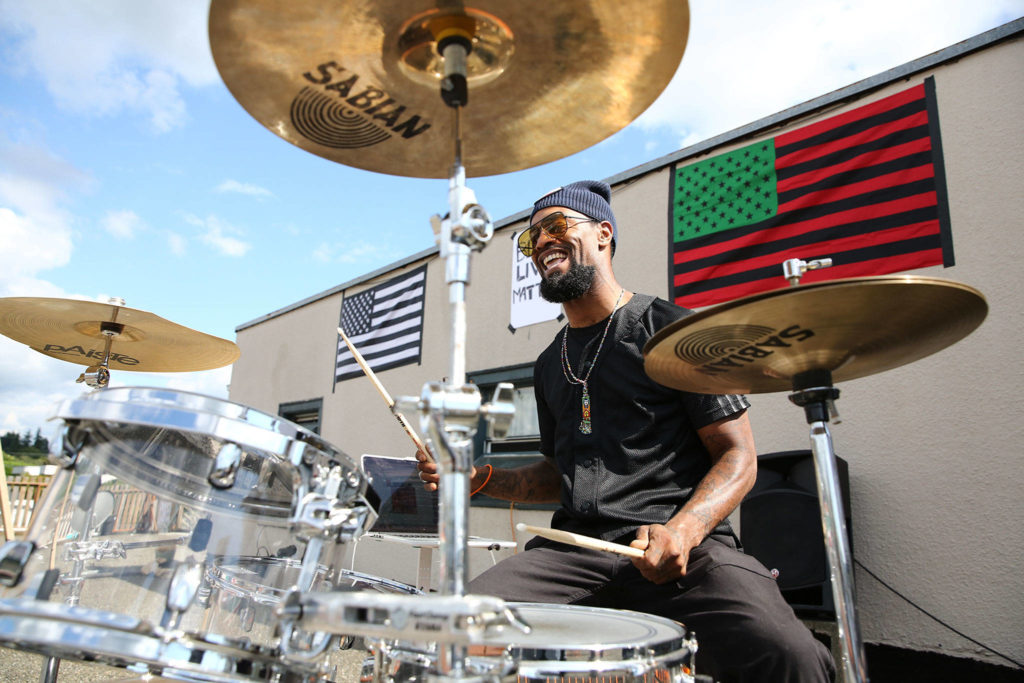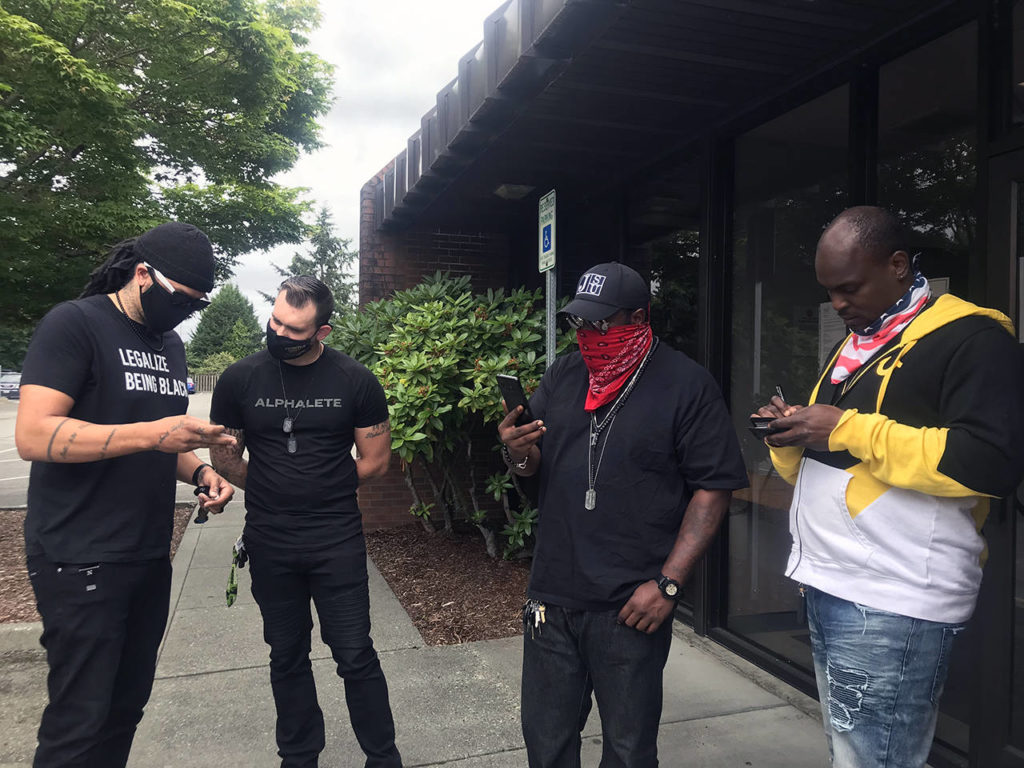MARYSVILLE — Elton Davis opened his mailbox in late June to find a surprise. It was a ticket summoning him to court for violating a city noise ordinance.
Davis, a Navy veteran, was puzzled.
Over the preceding weeks, Davis and his friends had joined in nationwide Black Lives Matter protests in their own way, through music, by playing instruments and loudspeakers every Saturday on the roof of his apartment building near one of Marysville’s busiest intersections, at Grove Street and State Avenue.
Those below have a clear view of a drum kit in front of a wall adorned by flags and posters, with messages such as, “We are still not free.”
Davis said they were not aware of receiving any official warning that they were being too loud, prior to the citation. During one of the first protests, an officer stood on the sidewalk below and told them a nearby retirement home complained, but didn’t mention that they were in danger of criminal charges.
So he didn’t know who was labeling his form of protest as a public nuisance.
The complainant, it turned out, was an on-duty Marysville police officer.
According to a police report obtained by The Daily Herald through a public records request, Marysville officer David Allen noticed the group June 20, while on the way to a verbal domestic violence report. He diverted from the call, took photos of the musicians from his car and then drove behind the building. He wrote in the report that he didn’t get out to talk due to “safety issues presented in past contacts with the occupants.”
Davis and the rest of the group have been protesting police brutality following the death of George Floyd and other Black people killed at the hands of police.
Dozens of protesters have gathered on the roof every Saturday, from 4 to 8 p.m. (They said once they played until 8:30 p.m.) Some live in Marysville, some in Everett. They wanted to see a demonstration closer to home. Most of them are Black men under the age of 40, said Jordon Jeffries, one of the organizers.
The group did not secure a permit to protest, Jeffries said, because they’re on private property.
Many of the protesters are musicians, including Jeffries, 39.
“Everyone out there is out there for positive reasons,” Jeffries said. “Signs we are holding up say things like, ‘It could have been my son,’ and our kids are coming. We keep them away because we want them more distanced than we are, but it’s a family event. It’s not an aggressive protest whatsoever.”
He believes they’ve been cautious about the volume. They’ve checked with nearby business owners and stood on the street to listen. Most buildings in that area are for commercial use. No one has directly told the protesters they’ve been bothered. It’s a noisy intersection anyhow, because of car engines and train whistles.
Multiple people have called police to complain about the music in previous weeks, Marysville Police Department spokesperson Mark Thomas said. He also said a sergeant with the department warned the group about the violation before. He didn’t know if any member of the public complained on June 20.
Around 6:15 p.m. that Saturday, Marysville police officer David Allen noticed the group while on his way to another call, he wrote in the police report. He was waiting at a red light, heading east on Grove, when he took a detour for about 15 minutes. The Marysville Police Department is less than a block away.
In his report, Allen never referred to the demonstration as a protest, nor did he mention Black Lives Matter, but noted people have complained about loud sounds coming from the building.
“I recognized the location as a recent location known for multiple nuisance, noise and party complaints, where they would have loud parties violating the noise ordinance,” he wrote.
Jeffries feels it has been obvious that they’ve been protesting for months now.
“We have signs, it was a protest,” Jeffries said. “So him trying to assume we felt like broadcasting a loud party to the city, that’s ridiculous. All the music we play is on topic for protests, we’re not playing ‘Uptown Funk’ or anything like that.”
He also doesn’t know why Allen would not have simply tried to talk to the group.
“Even if there were previous incidents there, he’s a police officer and he has a gun,” Jeffries said. “I don’t see why he would see us as unapproachable.”
Allen wrote that “each time contact was attempted by police we were greeted with non-compliance and hostility.” He drove behind the building to “determine who the resident was,” he wrote. He ran a license plate of a parked car that ended up being registered to Davis. Afterward, Allen searched records for Davis’ phone number. He found one, but when he called to ask Davis to turn down the music, he reached a voice mail box possibly belonging to a person named Joe, he wrote.
Officers try to make in-person contact when possible, Thomas said, but do not have to if they feel it could turn into a confrontation.
“It’s about managing each individual situation and thinking what’s the best course of action that reduces the risk for everybody involved,” he said.
A couple of days later, Allen’s police supervisor gave him permission to cite Davis. The ticket went into the mail.
Of all the demonstrators, Davis was the only one cited, because he lives there, Thomas said.
“In essence, he’s in control of the property,” he said.
The department has decided to reserve any other comments until the case has gone through the court system, Thomas said.
At the time of the 2010 census, 1.9% of the population in Marysville identified as Black, compared with 3.6% in the state. About 70,000 people live in Marysville today, according to state data.
Jeffries and others have been using the sound equipment to track decibel levels, to make sure they aren’t too loud.
“It’s not our first rodeo,” Jeffries said. “It’s obvious this is being brought up to stop us somehow, or just to make our lives more difficult. And as you’ve seen, it’s difficult.”
No decibel measurements were cited in Allen’s report.
Last week, Jeffries, Davis and a few others arrived at Marysville Municipal Court for a 2 p.m. hearing. Signs taped to the door said the courthouse was closed. Instead, the signs listed links to participate in the hearings through Zoom, an online video platform.
The paperwork told Davis to meet in a courtroom, with no indication the hearing would be online.
After a few minutes of confusion, one of the men pulled up the hearing on his cell phone. All five huddled around the device to listen to the judge, in the courthouse parking lot.
The judge referred to the gathering as a “concert,” rather than a protest.
“They knew exactly what we were doing up there,” Davis later said.
Davis, 34, figured he would just have to pay a fine. Instead he found out police are accusing him of a misdemeanor, punishable by up to 90 days in jail and a $1,000 fine.
City code includes provisions defining noise violations, including one that says: “The creation of frequent, repetitive or continuous sounds which emanate from any building, structure, apartment, or condominium which unreasonably interferes with the peace, comfort and repose of owners or possessors of real property, such as sounds from musical instruments, audio sound systems, band sessions, or social gatherings.”
Davis pleaded not guilty. His next court date is set for Aug. 3.
Davis can’t afford to hire an attorney, and this could become the first serious mark on his criminal record other than a driving offense. This case is more than a mere inconvenience, he said.
“Everybody here right now is supposed to be at work,” he said. “I’m a barber. I don’t cut, I don’t eat. My son doesn’t eat. So you know, I had to take all this time out of my day to do this, just to find out I have to do it through a Zoom meeting I wasn’t even informed to do so.”
Since the citation, Davis and the group have been on the rooftop a few more times and haven’t heard any other complaints. They plan to keep protesting.
“We’re not stopping until we see real change,” Davis said. “All these guys can attest, we have had more love and less middle fingers driving by, so I would honestly like to say, and I believe in my own heart, that we’ve made a little bit of a difference in people.”
Stephanie Davey: 425-339-3192; sdavey@heraldnet.com; Twitter: @stephrdavey.
Talk to us
> Give us your news tips.
> Send us a letter to the editor.
> More Herald contact information.
